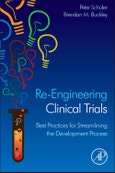The pharmaceutical industry is currently operating under a business model that is not sustainable for the future. Given the high costs associated with drug development, there is a vital need to reform this process in order to provide safe and effective drugs while still securing a profit. Re-Engineering Clinical Trials evaluates the trends and challenges associated with the current drug development process and presents solutions that integrate the use of modern communication technologies, innovations and novel enrichment designs. This book focuses on the need to simplify drug development and offers you well-established methodologies and best practices based on real-world experiences from expert authors across industry and academia. Written for all those involved in clinical research, development and clinical trial design, this book provides a unique and valuable resource for streamlining the process, containing costs and increasing drug safety and effectiveness.
Please Note: This is an On Demand product, delivery may take up to 11 working days after payment has been received.
Table of Contents
Section 1: Why Does the Industry Need a Change? 1. Why is our industry struggling? 2. What are the current main obstacles to reach drug approval? 3. Japan: An opportunity to learn? 4. The "Clinical Trial App"
Section 2: What Does Our Industry and What Do Others Do 5. What does "re-engineering" mean in our industry? 6. How can the Innovative Medicines Initiative help to make drug development more efficient? 7. Experiences with Lean and Shopfloor Management in R&D in other branches 8. Well-known methodologies, but not in our world: FMEA
Section 3: Where to Start: The Protocol 9. No patients, no data: Patient recruitment in the 21st century 10. The impact of bad protocols 11. Data mining for better protocols 12. It is all in the literature 13. What makes a good protocol better? 14. The Clinical Trial Site
Section 4: Alternative Study Designs 15. Do we need new endpoints? Surrogate and bio-marker 16. On the measurement of the disease status in clinical trials: lessons from MS 17. Generating evidence from historical data using "robust prognostic matching: Experience from Multiple Sclerosis 18. Studies with fewer patients involved: the Adaptive Trial 19. Studies with less site involvement: the Hyper Trial 20. Studies without sites: the Virtual Trial
Section 5: From Data to Decisions 21. Data standards against data overload 22. Data management 2.0 23. What do Sites Want? 24. From data to information and decision: ICONIK 25. Knowledge Management 26. Taking Control of Ever Increasing Volumes of Unstructured Data 27. Share the Knowledge based on quality data
Section 6: You Need Processes, Systems and People 28. It's all about the people (and their competencies) 29. Manage the Change 30. How Key Performance Indicators help to manage the change
Conclusions








